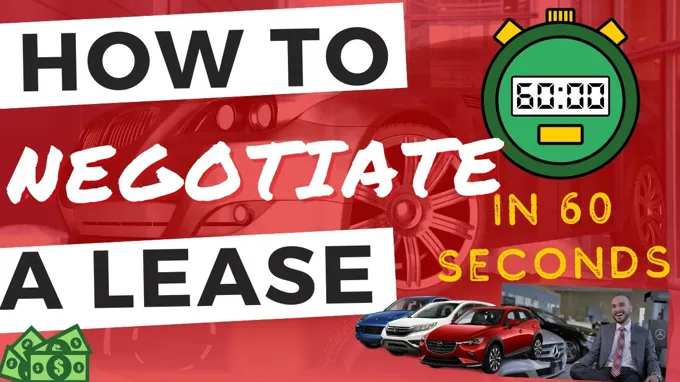Leasing a car can be a great way to get behind the wheel of a new vehicle without the upfront costs of buying. However, negotiating the terms of a lease can be a daunting task. With so many variables to consider, it’s easy to feel overwhelmed.
But fear not, with a few tips and tricks, you can walk into the dealership confidently and come out with a lease that works for you. First, it’s important to understand the components of a lease agreement. The three main factors to consider are the down payment, monthly payments, and the length of the lease.
Knowing your budget ahead of time is crucial so you don’t end up locking yourself into a lease that you can’t afford. One handy tip is to negotiate the purchase price of the car as if you were buying it outright, then use that number to determine your monthly lease payments. This approach can help ensure that you’re not paying too much for the vehicle and can save you hundreds or even thousands of dollars over the course of the lease.
Another important point to keep in mind is that everything in a lease agreement is negotiable. Don’t be afraid to ask for additional mileage allowances or to request a lower interest rate. Dealerships want to make a sale, and if you’re a serious buyer, they may be willing to work with you to find a mutually beneficial agreement.
By doing your homework ahead of time and being willing to negotiate, you can lease a car with confidence and peace of mind. With these tips and tricks, you’ll be on your way to finding the perfect lease agreement for your needs and budget.
Table of Contents
Do Your Research
When it comes to negotiating a car lease, one of the most important steps is doing your research beforehand. Start by determining what type of car you’re interested in leasing, and then compare prices and lease offers from multiple dealerships and leasing companies. Don’t be afraid to ask questions and negotiate for a better deal – remember, the goal is to get the best possible monthly payment and lease terms that meet your needs and budget.
Additionally, be sure to check your credit score and credit report ahead of time, as this can impact your ability to qualify for a good lease offer. By doing your research and being prepared before entering into negotiations, you can increase your chances of securing a favorable car lease that works for you.
Research the Car Model and Make
When shopping for a car, it’s essential to do your research before making a purchase. Take the time to research different car models and makes, so you can find a car that fits your needs and budget. Consider factors like fuel efficiency, reliability, safety features, and overall performance.
Look up online reviews and ratings from reputable sources and consider talking to friends and family members who own a similar car model. It’s also a good idea to test drive the car yourself to get a feel for how it handles on the road. Doing your research can help you make an informed decision when it comes to buying a car that meets all your criteria, leaving you with a vehicle that you’ll be happy with for years to come.
Remember, the more research you do, the better equipped you’ll be to negotiate a fair price and get the best deal possible. So take your time and do your research to find the perfect car for you.

Know the MSRP
When it comes to buying a car, doing your research is crucial. One important aspect of this research is knowing the MSRP (Manufacturer’s Suggested Retail Price). MSRP is the price that the car manufacturer recommends that a dealership charge for a new vehicle.
It is important to know this price because it sets a baseline for negotiation and can prevent you from getting ripped off. However, it’s essential to keep in mind that the MSRP doesn’t take into account any additional fees, taxes, or incentives that might apply. These extra costs can significantly impact the final price you pay for the car.
That’s why it’s important to do your research and understand all the factors that influence the price of the car you’re interested in. By knowing the MSRP and understanding all the fees associated with the purchase, you’ll be better equipped to negotiate a fair price and end up with a great deal on your new car.
Research Current Incentives and Rebates
When looking to save on your next big purchase, it pays to do your research on current incentives and rebates available to consumers. A quick online search can reveal a wealth of information on savings opportunities in your area, from manufacturer discounts to government rebates. Taking advantage of these offers can help reduce the overall cost of your purchase, making it more accessible to a broader audience.
Additionally, many rebates and incentives require specific qualifying criteria, such as income level or purchasing a specific product, so it’s important to read the fine print to ensure you meet all requirements. By staying informed and taking advantage of available savings opportunities, you can make the most of your budget and feel confident in your next purchase.
Understand Lease Terms and Finance
If you’re looking to lease a car, understanding the lease terms and finance is crucial to getting the best deal possible. When negotiating a car lease, it’s important to make sure you understand the terms of the lease agreement before signing on the dotted line. This includes the monthly payment, length of the lease, mileage allowance, and any fees or penalties associated with the lease.
It’s also important to understand the financing options available to you. Some leases may require a down payment, while others may offer low or zero down payment options. By understanding your lease terms and finance options, you can make an informed decision that fits your budget and lifestyle.
Don’t be afraid to ask questions and negotiate the terms to ensure you’re getting the best possible lease deal. Remember, the goal is to find a lease agreement that works for you in the short term and the long run, so take the time to carefully consider your options before making a decision.
Understand the Terminology
Leasing a car can be overwhelming, especially when it comes to understanding the terminology. One term that can cause confusion is “lease terms.” This refers to the length of time you will be leasing the car and typically ranges from two to four years.
It’s important to understand the lease terms before signing any agreements so you can plan ahead and budget accordingly. Another important term to know is “finance.” This refers to how you will be paying for the car over time.
Financing options often include a down payment and monthly installments. It’s important to understand your financing options and choose the one that works best for your budget. By familiarizing yourself with these terms, you can confidently navigate the car leasing process and make informed decisions that will benefit you in the long run.
Compare Leasing and Financing Options
When it comes to getting a new car, the two most popular options are leasing and financing. Understanding the terms of each can be confusing, so it’s important to do your research. Leasing a car means you’re essentially renting it for a set period of time and paying a monthly fee.
At the end of the lease, you’ll either need to return the car or buy it outright. Financing, on the other hand, means taking out a loan to purchase the car. You’ll own the car once the loan is paid off, and you can sell it at any time.
It’s important to consider your budget, as leasing may have lower monthly payments but can add up over time, while financing may have higher payments initially but can save you money in the long term. It’s also important to consider the terms of each agreement, such as mileage restrictions for leases and interest rates for financing. By doing your research and understanding the terms, you can make an informed decision about which option is best for you.
Calculate Your Budget
When negotiating a car lease, it’s important to calculate your budget beforehand. Determine how much you can afford to spend on the monthly payment, and factor in any additional costs such as insurance, maintenance, and registration fees. It’s also helpful to research the average lease payment for the make and model you’re interested in.
This way, you can ensure that the deal the dealership is offering is fair and reasonable. Don’t forget to negotiate for a lower interest rate or a higher mileage allowance if you plan on driving the car frequently. Keeping these factors in mind and doing your homework beforehand can help you secure a lease that fits your budget and needs.
Determine Your Monthly Payment Limit
Calculating your budget is critical when it comes to determining your monthly payment limit. Your monthly payment limit is the maximum amount you can afford to pay each month without hurting your overall financial standing. To calculate your monthly payment limit, you first need to assess your monthly expenses and income.
Start by listing all of your monthly expenses, such as rent/mortgage, groceries, utility bills, car payments, etc. Once you have listed all of your expenses, subtract the total amount from your monthly income. The remaining amount is the maximum amount you can afford to spend on your monthly payment.
Keep in mind that you should set a realistic payment limit that won’t lead to financial instability. Remember that unexpected expenses may arise, and having a solid understanding of your monthly budget will help you avoid overspending and ensure that you can afford your monthly payments.
Consider Upfront Costs
When deciding on a budget for any project, whether it’s a home renovation or a new business venture, it’s essential to consider upfront costs. Upfront costs are the expenses that must be paid before you start the project. These costs can include permits, legal fees, equipment, and materials.
It’s crucial to calculate your budget accurately, including these upfront costs, to avoid any surprises. One way to do this is to create a spreadsheet outlining all the expenses, including the smallest ones. Another option is to consult with professionals in your field or industry to get an idea of what other businesses or homeowners have spent in the past.
Don’t forget to factor in any unforeseen costs that may arise during the course of the project, such as emergencies or changes in design. Remember, by preparing sufficiently for upfront costs, you’ll be better equipped to handle any unexpected expenses and ensure a successful project completion.
Negotiate the Lease
Negotiating the lease for a car can be a daunting task for many people, but it doesn’t have to be. Here are some tips on how to negotiate a car lease and get the best deal possible. First, do your research and compare prices from different dealerships to see who offers the best lease terms.
Then, don’t be afraid to negotiate the monthly payment or the overall price of the car. Remember that everything is negotiable, including the down payment and the length of the lease. You can also ask for additional perks such as free oil changes or tire rotations.
When negotiating, be polite and respectful, but stand firm on what you want. Finally, read the lease agreement carefully before signing and don’t be afraid to ask questions to clarify anything that may be unclear. With these tips, you can negotiate a car lease that works for both you and the dealership.
Start the Negotiation Process
When looking to lease a property, it is important to start the negotiation process in order to ensure the best possible terms for yourself. This involves discussing the lease agreement with the landlord and coming to mutually agreeable terms. Make sure to have a clear understanding of what is included in the lease, such as utilities, parking, and maintenance.
Additionally, consider negotiating the length of the lease, as longer lease terms may provide you with more stability and better pricing. Remember, negotiation is a two-way street, so be open to compromises and respectful in your interactions with the landlord. By negotiating the lease, you can ensure that you are getting the best possible deal and setting yourself up for success in your new space.
Make an Initial Offer
When you have found the perfect place for your business, it’s time to start negotiating the lease. The first step is to make an initial offer that reflects your needs and budget. It’s important to understand that leases are negotiable, and landlords are often willing to make changes to accommodate their tenants.
Start by researching the market and finding out what comparable properties are renting for in the area. Use this information to make a reasonable offer that takes into account the location, size, and condition of the property. Remember to include any additional requests such as utilities, maintenance, or parking.
By making a well-informed and fair initial offer, you establish a good starting point for negotiations. This sets the tone for the rest of the negotiation process, and it’s easier to make concessions when both parties are working towards a common goal. With a clear understanding of what you need and what you can afford, you’ll be able to negotiate a lease that works for you and your business.
Consider Counteroffers and Incentives
As you negotiate the lease for your business, it’s important to consider the possibility of receiving counteroffers and incentives from the landlord. A counteroffer is when the landlord presents a different proposal than the one you initially made, usually with some changes to the terms and conditions of the lease. This can be an opportunity to negotiate further and potentially get a better deal.
Incentives, on the other hand, are perks that the landlord may offer to sweeten the deal, such as free rent for the first month or waived security deposits. These can be beneficial for your business, but it’s important to carefully review the terms and conditions to make sure they are favorable for you in the long run. Keep in mind that these offers are not guaranteed and may vary depending on the landlord and the property, so it’s important to stay flexible and open to discussing different options.
By being proactive and considering these factors, you can negotiate a lease that works best for your business and ensures a successful future.
Finalize the Lease Agreement
Once you’ve reached an agreement with the car dealer on the lease terms, it’s time to finalize the lease agreement. This is the last step before you can drive off with your new car. Before signing the agreement, make sure you read it through carefully, including all the fine print.
This will help you ensure there are no surprises down the line. Check that the terms are consistent with what you agreed upon with the dealer, and if there are any disparities, don’t be afraid to ask questions and negotiate further. Keep in mind that once you sign the lease agreement, it becomes a binding contract, so you want to make sure you’re fully comfortable with the terms before putting pen to paper.
By following these steps and negotiating fairly, you can feel confident that you’ve gotten a good deal on your lease.
Read and Understand the Contract
Finalizing the lease agreement can be a daunting task, especially when it comes to reading and understanding the contract. It’s important to take your time and ensure you fully comprehend the terms and conditions outlined in the document before signing on the dotted line. Don’t be afraid to ask questions or seek clarification from the landlord or leasing agent.
It’s better to be safe than sorry, as you don’t want to be locked into a lease that you don’t fully understand or agree with. Additionally, be sure to review any addendums or amendments to the lease and make note of any changes that have been made. Once you’ve read and understood the lease agreement, you’ll be able to finalize the contract with confidence, knowing that you’ve made an informed decision.
Negotiate Fees and Charges
When finalizing a lease agreement, it’s important to negotiate fees and charges to ensure that you’re not overcharged or blindsided by unexpected payments. Before signing the lease contract, it’s important to review and understand all the fees and charges mentioned in it. If there are any fees that you don’t understand or feel are unreasonable, don’t hesitate to negotiate with your landlord.
One way to do this is to point out the market rates for similar rentals in the area and see if you can get some leeway in the fees. Another option is to offer to sign a longer lease or prepay rent to see if the landlord would be willing to waive or reduce some fees. The key is to be clear and respectful when negotiating, while keeping in mind that the landlord may have their own limitations and constraints.
Ultimately, a successful negotiation can lead to a rental agreement that works for both parties, ensuring a positive and stress-free renting experience.
Sign the Lease Agreement
After all the hard work of finding your dream rental property, it’s time to finalize the process by signing the lease agreement. This step is crucial as it signifies the legal agreement between the landlord and the tenant. Before signing, make sure to thoroughly read the lease agreement and ask any questions or request clarifications.
Ensure that all crucial details such as rent amount, payment due dates, termination clauses, and security deposit refunds are clearly stated. It’s also important to understand any fees or penalties associated with breaking the lease agreement early. Once you are confident with the contents of the lease agreement, sign it and keep a copy for your records.
Signing the lease agreement is the final step before moving into your new home, so take your time and make sure all terms are agreeable before finalizing this crucial step in the rental process.
Conclusion
In conclusion, negotiating a car lease may seem intimidating, but it’s all about being prepared and confident. Do your research, know your budget, and don’t be afraid to walk away if the deal isn’t right for you. Remember, negotiating is a give and take process – the goal is to find a mutually beneficial agreement.
So go forth, negotiate like a pro, and drive off into the sunset in the car of your dreams (at a price you can afford, of course).”
FAQs
What factors should I consider when negotiating a car lease?
When negotiating a car lease, consider the residual value, interest rate, lease term, down payment, and any fees or taxes that may be applied to the lease.
Is it better to lease or buy a car?
The decision to lease or buy a car depends on individual needs and preferences. Leasing may be more beneficial for those who want lower monthly payments and the ability to drive a new car every few years, while buying may be better for those who want to own the car and have more long-term savings.
Can I negotiate the lease price of the car?
Yes, you can negotiate the lease price of the car. Research the market value of the car and negotiate from there. You can also negotiate fees and interest rates to get the best deal possible.
How can I reduce my monthly lease payments?
To reduce your monthly lease payments, consider increasing the down payment, negotiating a lower interest rate, opting for a longer lease term, and choosing a car with a higher residual value.
What happens at the end of a car lease?
At the end of a car lease, you have the option to either return the car, buy it outright, or trade it in for a new lease. You may also be charged for any excess wear and tear or mileage over the agreed-upon amount in the lease contract.
Can I break a car lease early?
Yes, you can break a car lease early, but you will likely be charged an early termination fee. It is important to read the lease contract and understand the terms and conditions before signing.
What should I do if I can’t afford my car lease payments?
If you can’t afford your car lease payments, you may be able to negotiate a lower monthly payment or explore options such as transferring the lease to someone else or returning the car early. It is important to communicate with the leasing company to find a solution.



